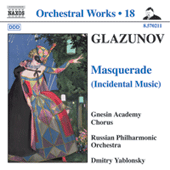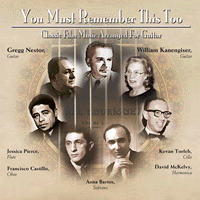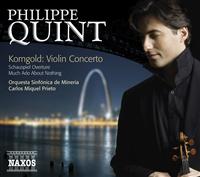Masquerade/Glazunov
July 31, 2009


Over my many years of listening to Russian classical music Alexander Glazunov has been one of the staples in my collection. Alexander was quite prolific with 110 numbered works and another 40 works without an opus number. He began composing at a rather early age (16) and he continued for 50+ years composing 8 symphonies, 7 string quartets, 5 concertos, 3 ballets, and numerous orchestral works. However, “Masquerade” slipped under my radar and this new Naxos release #8.570211 is my first experience with this music except for the “Valse-Fantaisie” section of the work, a highly addictive melody of the first order. This is something I’ve heard and enjoyed for many years.
The Lermontov play, written in 1836,was a criticism of the decadence of the St. Petersburg society and his critique of contemporary society was promptly banned for 30 years. Glazunov wrote the music in 1912-13 for Meyerhold’s production, which was performed in 1917. Even though there are 26 tracks for the 38+ minutes it is recorded in such a way that the transition from track to track flow isn’t noticeable at all. While this reviewer has never had the opportunity to see a production of the play I had no problem listening to the music as a separate stand-alone experience. It is filled with wonderful dances written in Mazurka, Quadrille, Galop, Polonaise, and Valse style, all melodic and quite easy on the ear. While the work definitely has the sound of Russia and Glazunov, it doesn’t have the heaviness in the orchestration, which is often associated with Russian classical material. One could easily download the five dance and waltz tracks to a MP3 device and have 16 minutes of easy to listen to material. Act 1V Scene 1 is certainly one that you would hear in a church and the Gnesin Academy Chorus without orchestra sings it in a very moving religious rendition. The chorus is also a welcome addition to the “Mazurka,” a lively dance with another catchy melody. You’ll also enjoy the melodies of the “Polonaise,” “Galop,” and the “Quadrille.”
Two Pieces, a work written early on (1886) is a fine example of the tranquil delicate side of Alexander. It features first a pastoral setting and then a bit oriental mystery and intrigue. Pas de caractere is a Hungarian dance filled with a gypsy passion. Intermezzo romantico, has a title that s peaks for itself.
While I cannot put Glazunov in a top category as a composer I certainly must rate him as being well above average for all of the recordings that I own. This recording is no exception. It is one that is filled with a variety of styles, orchestrations, and strong melodies. The Naxos affordable price is always a bonus. Recommended
Maintitles rating is ***1/2
Performed by: Russian Philharmonic Orchestra conducted by Dmitry Yablonsky and the Gnesin Academy Chorus
Naxos CD# is 8.570211
Track Listing:
Act I
1….Tableau 2 (0:47)
2….Pantomime 1 (0:32)
3….Mazurka…. (4:07)
4….Pantomime 3 (1:53)
5….Quadrille (1:11)
6….Pantomime 4 (1:09)
7….Scene 2 (0:50)
8….Pantomime 5 (0:23)
9….Scene 3 (1:06)
10. Pantomime 6 (0:59)
11. Scene 4 (0:47)
12. Pantomime 7 (0:13)
13. Entrance 7 (0:28)
14. Pantomime 8 (0:17)
15. Scene 6: Galop (2:24)
Act III
16. Tableau 8: Polonaise (3:04)
17. Tableau 3: Chiming Clock (0:59)
18. Tableau 6 (0:24)
19. Valse-Fantaisie (5:37)
20. Tableau 9 (1:02)
21. Entr’acte (1:45)
Act IV
22. Scene 1 (3:15)
23. Entrance 6 (0:27)
24. Pantomime 11 (0:22)
25. Chorus (0:37)
26. Moderato (2:56)
Two Pieces, Op. 14
27. No. 1: Idylle (8:38)
28. No. 2 Reverie orientale (7:15)
29. Pas de caractere, Op. 68 (2:22)
30. Romantic Intermezzo, Op. 69 (11:09)
Total Time is 66:57
You Must Remember This Too/Nestor
July 17, 2009
 You Must Remember This Too is a second installment of film music for classical guitar performed by Gregg Nestor and other musicians depending on the composition, although the primary instrument is acoustic guitar. Gregg released The Miklos Rozsa Collection (BSX 8842) in 2008, which definitely got my attention and wet my appetite for more material. He performed Rozsa in a way I’ve never quite imagined. Many of his choices couldn’t be put into the standard fare category for a compilation of film music material and yet all of the selections are most satisfying, especially given the target market that Gregg is looking for.
You Must Remember This Too is a second installment of film music for classical guitar performed by Gregg Nestor and other musicians depending on the composition, although the primary instrument is acoustic guitar. Gregg released The Miklos Rozsa Collection (BSX 8842) in 2008, which definitely got my attention and wet my appetite for more material. He performed Rozsa in a way I’ve never quite imagined. Many of his choices couldn’t be put into the standard fare category for a compilation of film music material and yet all of the selections are most satisfying, especially given the target market that Gregg is looking for.Leading off this unusual program is the wild wacky Oscar nominated It’s A Mad, Mad, Mad, Mad World, a composition which always brings a smile to my face and this arrangement for two guitars is no different. One of the themes I just couldn’t imagine being done on a guitar (no more), is the Oscar nominated score All About Eve. The dynamic duo seems to cover all the bases on this one. Another Oscar nominee, Wuthering Heights, is given a lush romantic treatment and is definitely a track to be played during those quiet moments after a long day at work. Suite In The Olden Style is a collection of Rozsa compositions for guitar, flute, oboe, and cello in a baroque style. Rozsa fans will recognize the themes from his films Madame Bovary, Moonfleet, V.I.P.S., Diane, and Young Bess. Liken this suite to another composer, Korngold, who also used his themes in his classical works.
I can assure you that you’ll never hear anything again quite like the performance of the Psycho suite for 2 guitars. I took the time to listen to the Salonen/L.A. Philharmonic version
https://sdtom.wordpress.com/2006/09/26/herrmann-the-film-scores/
Violin Concerto in D major, Op. 35/Korngold
July 9, 2009
 As much of a child prodigy as Mozart, Korngold has the distinction of being perfectly at home in the concert hall or film stage. While Waxman, Goldenthal, Rozsa, Herrmann, and John Williams have composed works for symphony orchestra, only Korngold can boast of composing successful operas as a teenager, having a wonderful career as a highly successful composer for the silver screen, and then returning to the concert hall for the rest of his career.
As much of a child prodigy as Mozart, Korngold has the distinction of being perfectly at home in the concert hall or film stage. While Waxman, Goldenthal, Rozsa, Herrmann, and John Williams have composed works for symphony orchestra, only Korngold can boast of composing successful operas as a teenager, having a wonderful career as a highly successful composer for the silver screen, and then returning to the concert hall for the rest of his career.
This CD was released at the same time as the Tribute Film Classics (TFC1006) complete reconstruction recording of the 1937 Warner Brothers The Prince And The Pauper. In fact I’d just finished listening to it and was checking for grammar and spelling on my review as I began to listen to the new Naxos release of the Violin Concerto. What a special treat to be able to hear the Prince and Pauper theme fully developed in the 3rd (Finale) movement of the concerto. Warner Brothers had agreed to let Korngold re-use his themes in his concert works thus the D major Violin Concerto contains the themes from Another Dawn, Juarez, Anthony Adverse, and The Prince And The Pauper. The truly romantic melodic piece, with sections of virtuosity playing from Philippe Quint, puts you on that blanket in a favorite place sharing a lunch with someone you hold dear. Film music but in a different context.
Written at the age of 14, the Schauspiel Overture (Overture to a Drama), Op. 4 is certainly a mature work considering the young age Korngold composed and orchestrated it. It begins sounding much like a Wagner intro to an opera, quite Germanic and dramatic. However, it changes gear and you can hear his style he used in such films as “The Adventure of Robin Hood.” It’s a jovial carefree time where you envision people running about preparing for a huge festival.
The final selection on the recording is an orchestral version of the music from the 1918 play Much Ado Nothing. The original concept of chamber orchestra had to be re-arranged for violin and piano only and the version performed on this CD is rarely if ever heard. The concert suite is something that you’d expect to hear in music about the Shakespeare play. It is a jovial, lively, and romantic 16+ minute work that expresses the versatility of Korngold.
Film music lovers will relish the Violin Concerto and the performance of Philippe Quint and the themes it offers. The Schauspiel Overture and Much Ado About Nothing Suite are really nice additions and merely enhance this CD. Recommended.
Main titles Rating is ****
Produced by David Frost
Naxos CD# is 8.570791
Track List:
Violin Concerto in D major, Op. 35
1…Moderato nobile (8:49)
2…Romance: Andante (7:50)
3…Finale: Allegro assai vivace (7:01)
4… Overture to a Drama, Op. 4 (13:31)
Much Ado About Nothing-Concert Suite, Op. 11
5…Overture (5:11)
6…Bridal Morning (3:24)
7…Dogberry and Verges (2:42)
8…Intermezzo: Garden Scene (2:10)
9…Hornpipe (2:40)
Total Time is 53:40